In this interview with Qassimy Brothers Carpet Company (QBCC), we delve into the rich history and evolution of one of Afghanistan’s leading handmade carpet firms. Since 1980, QBCC has been at the forefront of high-quality carpet production, gaining global recognition while maintaining strong ties to the local community.
From notable achievements like being Afghanistan’s largest carpet exporter to providing employment to thousands of artisans, we explore the company’s journey, innovations, and future direction in a rapidly evolving industry. QBCC’s commitment to quality, craftsmanship, and sustainability offers a unique insight into the world of handmade carpets.
QBCC has been in the handmade carpet industry since 1980. Can you share some of the key milestones and achievements in your journey so far?
Indeed, QBCC’s journey in the Afghan handmade carpet industry since 1980 has been marked by a number of significant milestones and achievements. Our commitment to manufacturing high-quality handmade carpets has enabled us to gain recognition as a leading firm in the industry.
Among our major achievements, we take great pride in being awarded the biggest carpet exporter of Afghanistan in 2022 and 2023. Beyond the honor, this recognition reflects our unwavering commitment to quality and innovation.
One of our core contributions, which we consider a significant milestone, has been in providing job opportunities. QBCC has been able to provide employment to more than 5000 women in Afghanistan. This accomplishment is particularly noteworthy considering the current difficult circumstances in Afghanistan.
Furthermore, our participation in major international handmade carpet exhibitions like Domotex in Hannover, Germany in 2019, 2022, and 2023, has significantly boosted our global presence and highlighted our dedication to the craft.
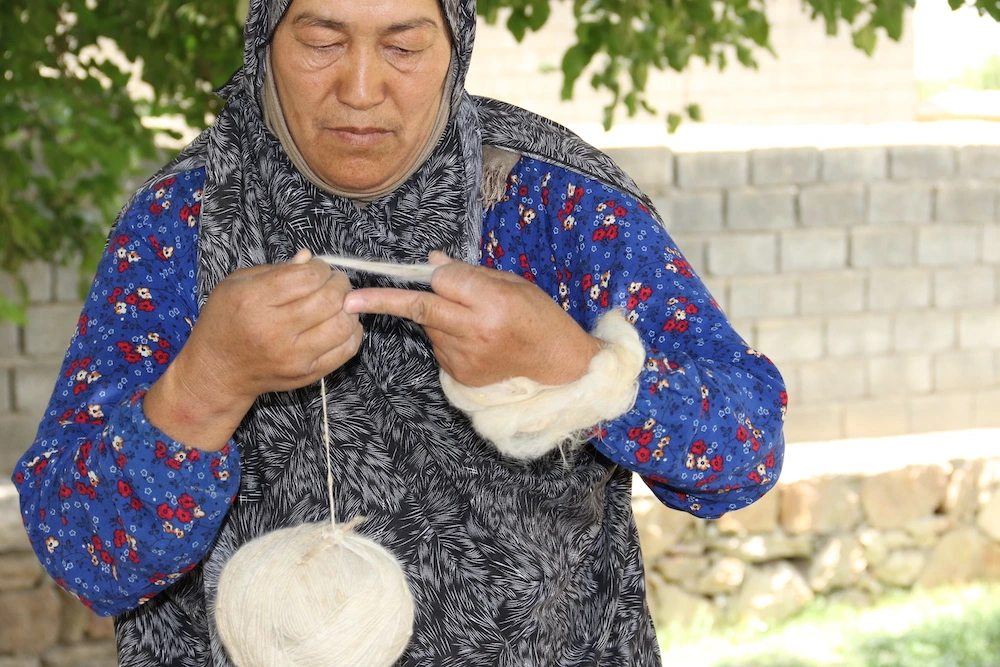
How has the market for handmade carpets evolved in Afghanistan over the years, and how has QBCC adapted to these changes?
Over the years, the handmade carpet market has seen significant developments. Historically, carpet production has been a deep-rooted tradition in Afghanistan’s economic and cultural landscape. However, varying circumstances, including political instability, attempts at modernization, and global market shifts, have shaped its development.
The quality, authenticity, and intricate designs of Afghan carpets have sustained high demand in international markets. Nevertheless, the industry has faced challenges due to a lack of standardization, inadequate marketing strategies, and geopolitical conflicts. Anyhow these hurdles, Afghan artisans have remained committed in their craftsmanship, and the carpet culture continues to persist.
In response to these changes, QBCC has made numerous adaptations to its operation to uphold the prestige of Afghan handmade carpets. Key strategies have concentrated on improving the quality of products, implementing quality control measures, and diversifying designs to cater to various global tastes. Additionally, QBCC has placed emphasis on fair pricing to ensure that artisan weavers are paid appropriately for their skill and hard work.
Moreover, to account for shifts towards e-commerce, QBCC has geared focus towards digitization to make our products accessible to a global audience.
Handmade carpets are known for their intricate craftsmanship. What steps does QBCC take to ensure the highest quality in your carpets?
Firstly, we ensure that only the best materials are used. We source premium-grade wool to make hand-spun woolen yarn in our own wool processing facility that are not only strong but also comfortable, ensuring our carpets are both durable and luxurious.
Similarly, we employ highly skilled artisans who uphold our values of craftsmanship. Their intricate hand-knotting techniques provide each carpet with uniquely detailed designs.
We also enforce strict quality control measures at each stage of production. Each finished piece undergoes a detailed quality check to ensure it meets our expected standards and our customer satisfaction.

Can you describe the process of creating a handmade carpet at QBCC, from design to final product?
The process begins with sourcing the highest quality wool locally. This wool is then transported to our wool and yarn processing facility in the Balk province of Afghanistan. Here the wool is carefully washed and then distributed amongst 450 highly skilled women who diligently transform this raw wool into quality hand-spun woolen yarn.
The next stage is design creation. Artists utilize their craft to devise intricate and unique patterns which will serve as blueprints for the carpets. To accurately reflect these designs into reality, the woolen yarn is then systematically dyed as per the design requirements.
Once dyed, the yarn is distributed to our carpet weavers. These artisans then begin the accurate process of weaving the threads into these beautiful carpets. Upon completion, these woven carpets are dispatched to QBCC’s quality control center where our experienced carpet masters ensure that the end-product perfectly interprets the initial design. This tough quality control process ensures we deliver carpets that meet the high standards we set for ourselves.
After this phase, the carpets are transported to our dedicated washing facility where they undergo a multi-step process. This includes washing, brushing, application of cleaning chemicals, burning the back of carpets, and shearing the pile of carpets. This process is performed with extreme care and precision as to not damage these delicate works of art.
The carpets then proceed to our finishing facility where the final touches are provided. Here, tasks such as carving, pile cleaning, framing, re-making the sides, and making the fringes are performed. Each carpet is then labeled for easy identification.
Once the finishing is complete, every piece is moved to our professional photo studio. High-resolution images capturing all the intricate details are taken, which we then share with our customers, providing a complete overview of our products.
The final step of the process involves exporting these gloriously crafted masterpieces to their respective destinations, where they can be appreciated for the art that they truly are.
A clear idea about the passion, precision, and care enveloped in every carpet we create!
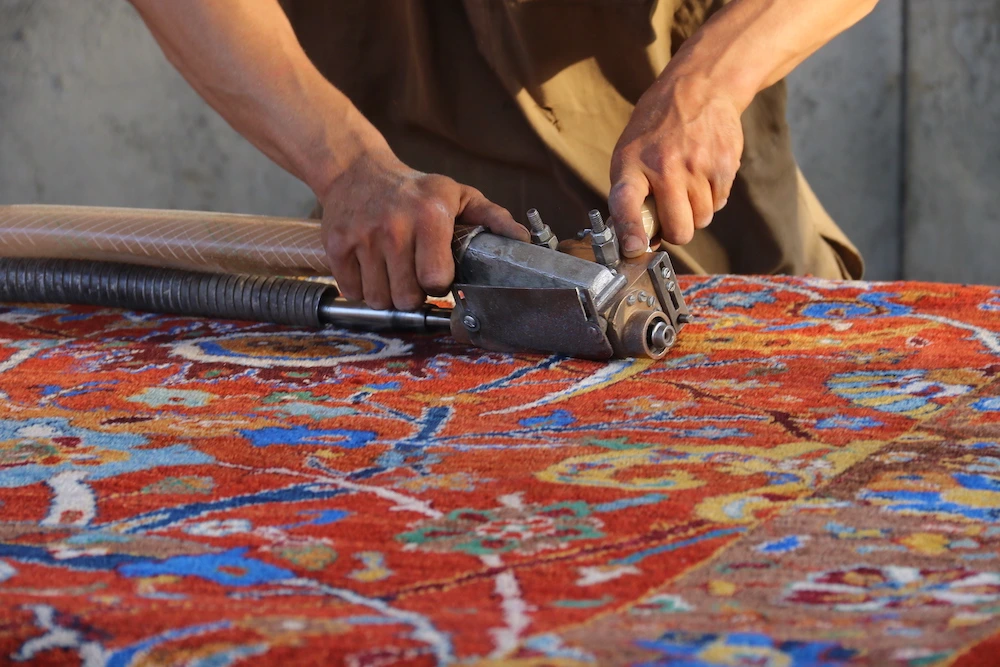
What types of materials do you use in your carpets, and how do these materials contribute to the overall quality and durability of your products?
All of our carpets are crafted from 100% locally sourced wool. The initial processing of this wool is done entirely by hand. We strongly believe in maintaining traditional techniques; thus, we wash and convert the raw wool into yarn manually to ensure the end product’s durability. We refrain from using machinery in our production process as it can break the fiber and weaken its strength significantly.
Secondly, our dyeing process stays true to our commitment to natural, traditional practices. We only utilize vegetable and natural elements for dyeing, a process that further enhances the durability of our carpets.
In summary, we are proud to claim that our carpets are 100% natural and forged by hands from start to finish, marking an ultimate blend of quality, durability and tradition.
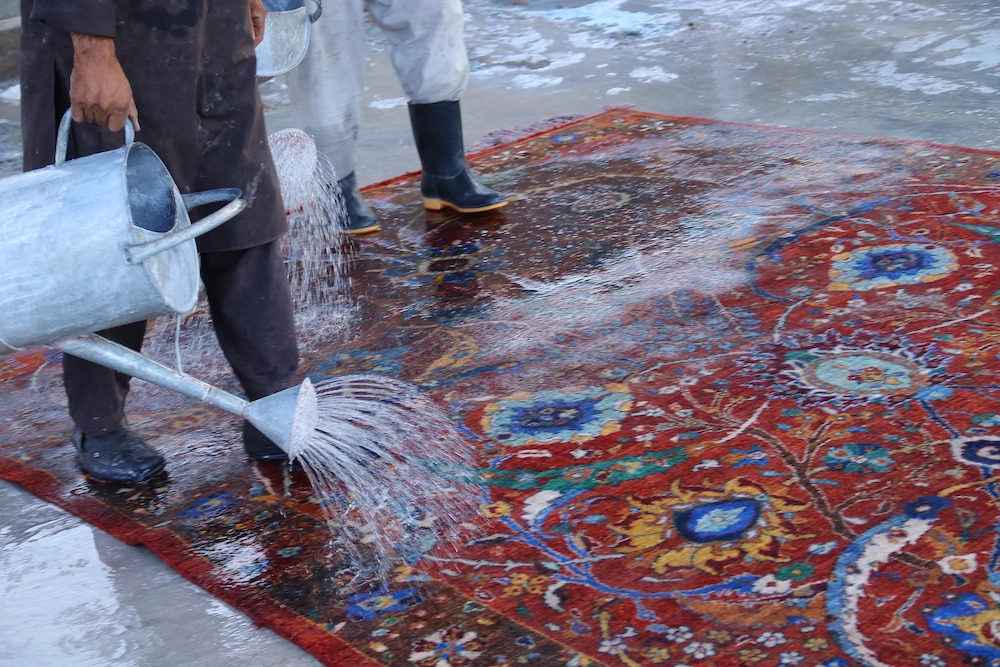
Who are your main customers, both in Afghanistan and internationally? How do you tailor your products to meet the needs of different markets?
Our clientele is quite diversified, both in Afghanistan and on the international stage. Domestically, our primary clients include homeowners seeking authentic, quality carpets for their residences, interior designers, and corporate entities who value the artistic of our handmade carpets for their premises.
Internationally, we supply to customers across varied geographical locations including United States of America, Europe, and parts of Asia as well as Australia. These clients chiefly comprise of global rug retailers, interior design studios, and private homeowners who have a taste for the unique blend of traditional and contemporary artistry that our carpets offer.
In terms of tailoring our products for different markets, our approach is largely consumer-driven. We take into consideration the consumer preferences in each region, their color affinities, design inclinations, and also the climatic conditions of the area. By blending traditional Afghan craftsmanship with market-specific demands, we’re able to offer designs that resonate with our diverse clientele.
Furthermore, we’re consistently in touch with our customers and retailers to receive feedback and make essential changes. This way, we can ensure that our carpets not only meet but exceed the expectations set by these different markets.
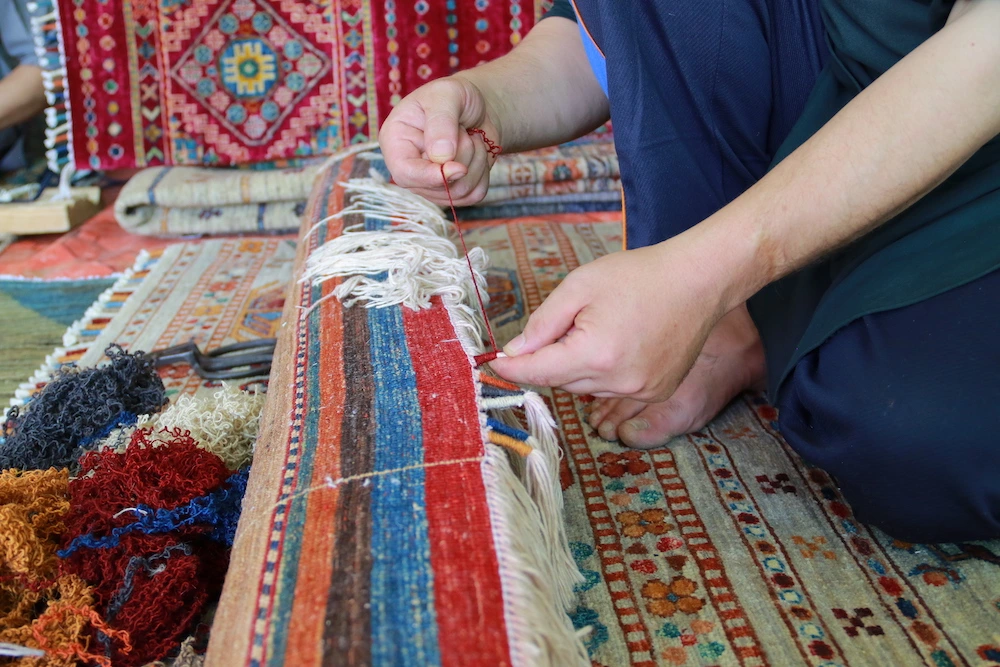
Have you noticed any recent trends in customer preferences for handmade carpets, and how is QBCC responding to these trends?
In recent times, we have indeed noticed a growing trend in consumer preferences with regards to handmade carpets. An increased awareness regarding the artistry, craftsmanship, and sustainable production processes involved in the creation of handmade carpets has led to a surge in their demand.
The taste of consumers is gravitating towards unique, eclectic patterns that are a mixture of both traditional and contemporary styles. Furthermore, there is a significant preference for natural, eco-friendly materials that offer longevity and durability.
To cater to these changes, our company has undertaken several responsive measures. We’ve actively begun sourcing more sustainably produced, organic materials for our carpets. Moreover, we have expanded our designs range to include a blend of conventional and modern themes, offering customization options for our customers too.
We believe in maintaining a balance between respecting tradition and welcoming innovation. Our aim is to provide an enriched customer experience by giving them superior quality products that are in sync with their expectations and the current trends.
QBCC is known for providing employment opportunities to the local community. How does your company contribute to the local economy and support the community?
We strongly believe in the culture of locally-based growth and development. One of our key mandates turns around creating employment opportunities within our local community. Just as QBCC is renowned for providing employment in carpet weaving and woolen yarn production, our firm also prides itself on offering jobs in our specialty areas.
Our firm thrives on joining local talent, encouraging skills development, and fostering an inclusive work environment. By doing so, we ensure an stable flow of income into local households, thereby significantly boosting the local economy.
Furthermore, our operations support local suppliers and small businesses, creating a synergistic and sustainable business ecosystem. We purchase locally, invest in local innovation, and prioritize the services of local enterprises in our supply chain.
Can you share any stories or examples of how QBCC has impacted the lives of local artisans and workers?
One story that comes to mind is about a young artisan named Ali. He grew up in a family of carpet weavers but had never considered it as a career. Qassimy Brothers Carpet Company presented him with such opportunity. Starting as an apprentice, he was able to master his craft and is now one of our lead designers, transforming his traditional family craft into a sustainable, rewarding career.
Another inspiring example is our worker’s cooperative initiative. Qassimy Brothers Carpet Company has been supporting this initiative for over a decade now. It not only provides a continuous flow of work, fair wage, and improved working conditions for our workers, but has also significantly improved their way of life, leading to better education and overall standard of living in our community.It’s stories like these that stand as testament to our commitment to positively impacting the lives of our local artisans and workers.
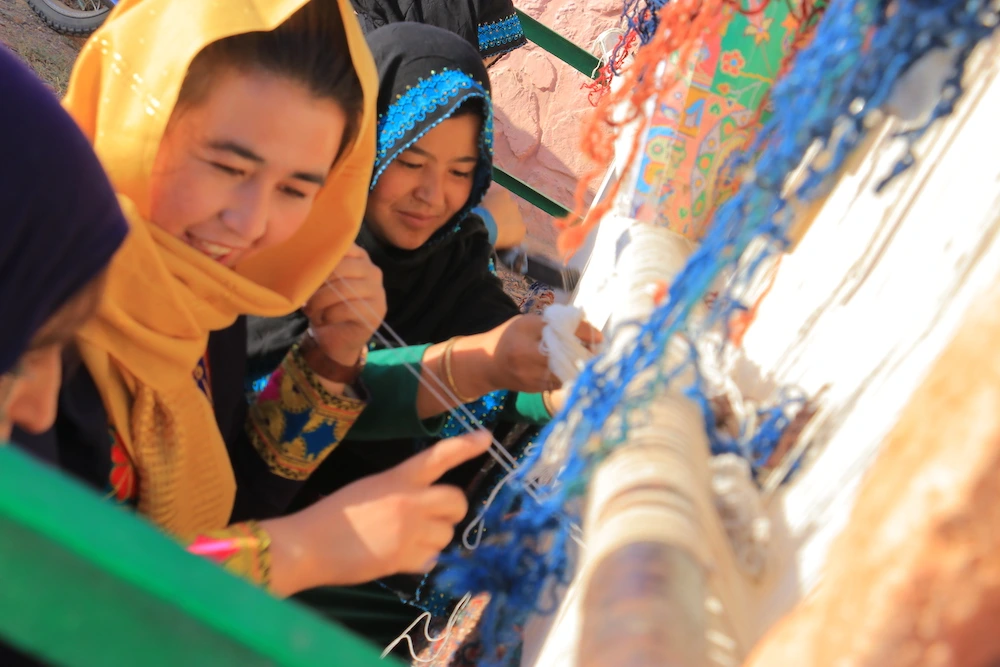
What are QBCC’s plans for the future? Are there any new products, designs, or markets you are looking to explore?
We are always in pursuit of growth and innovation. To this end, I am delighted to convey that we have big plans for the future. As a cornerstone of our expansion strategy, we are indeed planning to introduce a brand-new collection. This collection will incorporate innovative designs inspired by the blending of traditional and contemporary themes, reflecting the unique, intricate craftsmanship our carpets are renowned for.
Furthermore, we are also exploring opportunities to expand our market presence internationally. While we strive to enrich our existing markets, we are also keen on penetrating new markets that value the quality and magnificence of meticulously crafted carpets.
In addition, I am thrilled to tell you that we have undertaken intensive research to incorporate eco-friendly practices in our carpet production. We believe that as an industry leader, it is our responsibility to contribute positively towards the environment.
In a world where sustainability is becoming increasingly important, how is QBCC ensuring that its production processes are environmentally friendly?
At Qassimy Brothers Carpet Company, we acknowledge the growing emphasis on sustainability in today’s world. We strongly believe that environmentally-friendly carpet production not only benefits the planet but also ensures the durability of our business.
In light of this, we have taken strides in implementing several green initiatives within our production processes to reduce our carbon footprint. Firstly, we have invested in renewable energy sources, such as solar power, to fuel our operations. Furthermore, our carpets are made from 100% recyclable materials, reducing the demand for new resources and decreasing waste.
We are also working on energy-efficient machinery and have implemented a stringent water recycling process to minimize water wastage. In addition, we remain committed to ethical sourcing practices, ensuring that all raw materials used are sourced responsibly and sustainably.
We are continuously looking for innovative ways to further improve our practices and contribute positively towards a greener future. Upholding sustainable businesses practices is more than just an initiative; it is a core value at Qassimy Brothers Carpet Company.
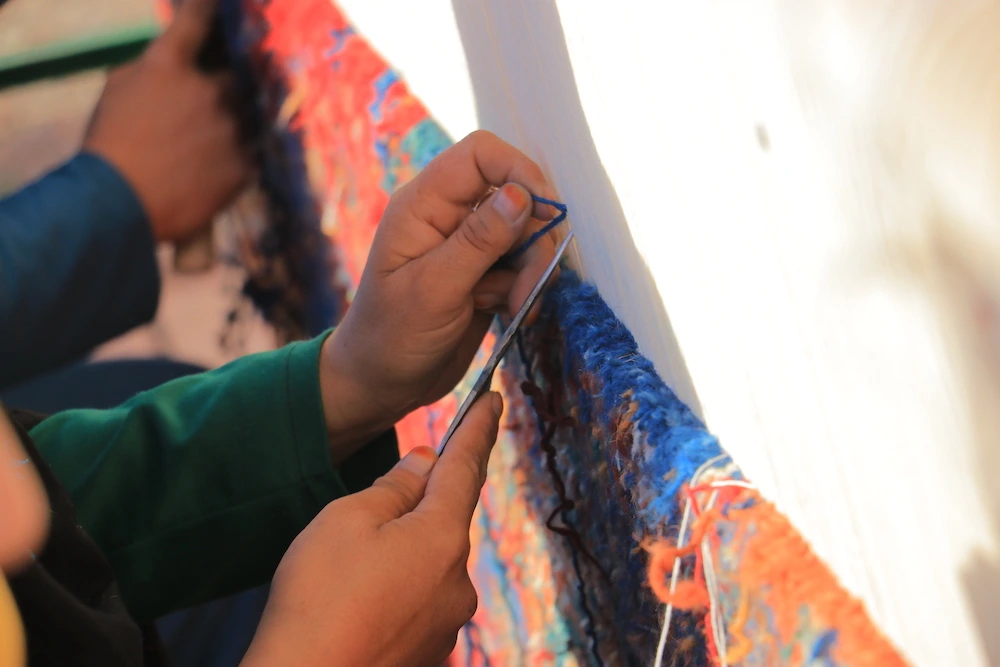
What are some of the biggest challenges you face in the handmade carpet industry today, and how is QBCC addressing them?
Presently, we confront a number of obstacles.
1- The handmade carpet industry is varied and involves a vast array of unique designs, techniques, and materials. While this contributes to the beauty and individuality of each piece, it can complicate efforts for standardization, making quality assurance for each product a challenging process. To address standardization, we are organizing initiatives to improve and enforce hard quality norms and checks at every production stage, ensuring each of our carpets represents the high standard we represent.
2- Secondly, the surge in machine-made carpets offers cheaper prices and faster production times, which attracts a certain buyer segment. QBCC continues to emphasize our commitment to quality and uniqueness, which truly sets our handmade carpets apart. In response to competition from machine-made carpets, we are investing significantly in marketing campaigns that educate the consumer about the value, durability, and aesthetic advantages of handmade carpets.



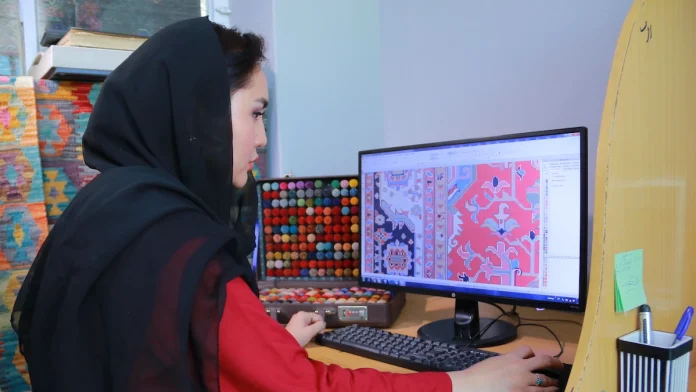

Hello, for Mena Cavering team, I am Qurban Ali Jamshedzada, the president of Jamshedzada Carpet Manufacturing Company, we are working in Kabul, Afghanistan, and we are interested in becoming a member of Mena cavering.